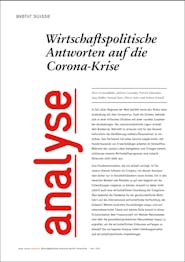The corona pandemic has hit Switzerland hard. While reducing the infection rate is the first priority, it is already clear that the resulting economic disruption will make economic policy decisions fundamental in the coming months. Almost CHF 12 billion will be needed in support each month, Avenir Suisse estimates. Here are our suggestions for ways forward:
From a social point of view, the challenge is to prevent prolonged recession. The Federal Council’s declaration of an ‘extraordinary situation’ for health preventative reasons means radical intervention in the freedom of trade and industry. Employees must remain employed (and continue to receive their wages) and companies must be able to process payments. The provision of liquidity for the real economy as well as the financial sector must be ensured.
One of the most effective measures is short-time work compensation, which can prevent extensive job cuts. But the scheme should be extended to those in the cultural sector, and, possibly, the self-employed. Such extraordinary measures should be limited to the duration of the lockdown. In addition, the federal government and the cantons must quickly and unbureaucratically set up central information points for SMEs and large companies. The authorities should also take an unbureaucratic and flexible approach to those sectors (especially healthcare with an excess demand for labour in the current crisis (e.g. by recruiting retired doctors and nurses).
Many companies are desperate for liquidity. The federal government, cantons, municipalities and social insurance companies can provide short-term relief by temporarily postponing claims. Additionally, a many companies require funds immediately, loans and credits must be granted through the banking system, with federal and cantonal guarantees. Such a model must be put in place quickly. Operational responsibility should lie not with the public administration, but the banks, which have the resources and experience necessary.
The economic stimulus packages sought by Switzerland’s trade unions to support the economy are unlikely to prove successful, as their effect would simply “fizzle out”. After all, stimulating consumption is largely undesirable at present, and measures should be limited to combat the virus. Demand-stimulating steps, such as investment programmes, would have just as little chance of success, as their effect – if it occurs at all – would lie way too far in the future.
The extraordinary situation will be tough on Switzerland’s public finances. Assuming that the impact on the affected sectors and companies lasts three months, the cost of short-time work compensation will amount to around CHF 21 billion – equivalent to around 3 percent of gross domestic product. The cost of liquidity loans is estimated at a good CHF 14 billion. This means that monthly financing requirements are expected to be around CHF 12 billion. The pandemic is an exceptional temporary situation and justifies such extraordinary action, which contributes to securing social order and economic continuity.










